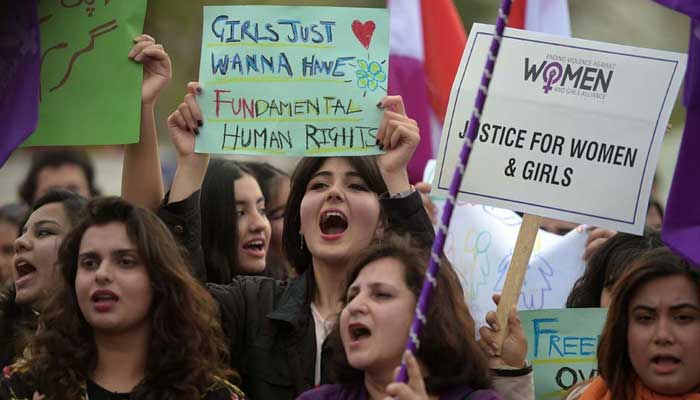The World Economic Forum (WEF) just dropped its Global Gender Gap Report 2025, and for Pakistan, the news couldn’t be worse. Ranked 148 out of 148 countries, Pakistan has officially been labelled the worst place in the world to be a woman. With a gender parity score of just 56.7%, the ranking has sparked outrage, frustration, and heartbreak across the country.
Breaking Down Pakistan’s Gender Crisis
The WEF ranks countries based on four key pillars: economic participation and opportunity, educational attainment, health and survival, and political empowerment. Unfortunately, Pakistan has shown major weaknesses in all of these areas.
- Women still earn 25% less than men for the same work.
- Over 90% of women have experienced domestic violence during their lifetime.
- Toxic portrayals of relationships in TV shows continue to normalize abuse.
- Horrifying cases like the murder of a 17-year-old girl for refusing a proposal show how dangerous it still is to be a woman in Pakistan.
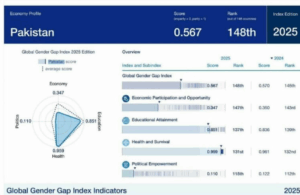
These aren’t just numbers they reflect daily realities that millions of Pakistani women face.
Social Media Reactions: Anger, Grief, and a Call for Change
As soon as the report was released, Pakistani Twitter (X) exploded with strong reactions. Many activists, journalists, and ordinary citizens shared their anger and heartbreak over the ranking.
Nida Kirmani tweeted: “Pakistan has now fallen to last place… officially the worst place to be a woman in the entire world.”
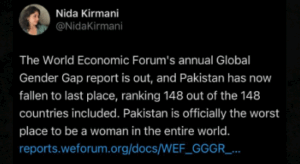
Journalist Muneeb Qadir didn’t hold back either, pointing out: “This is what happens when you morally police women, give impunity to perpetrators of honor killings, prevent Anti-Domestic Violence and Anti-Forced Conversion Bills from becoming laws, and enable child marriages.”
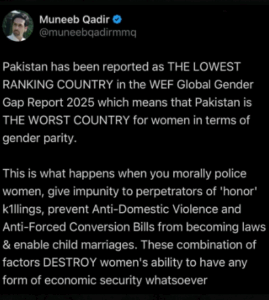
Syeda Nayab Bukhari called it “deeply alarming,” stressing that women make up nearly half of the population but face growing structural oppression. She urged international donors and policymakers to step up and ensure that women also benefit from any economic support provided to Pakistan.
Political Voices Speak Up
Even some political leaders have acknowledged the gravity of the situation. Mehnaz Akber Aziz, Member of National Assembly, tweeted: “Our heads hang in shame as Pakistan ranks 148th out of 148 countries… It’s truly an emergency.”
Wazma Khan Nasar added that this isn’t an accident but a result of years of systemic patriarchy: “Pakistan didn’t just fall behind, it was dragged here by decades of deliberate patriarchy and political cowardice.”
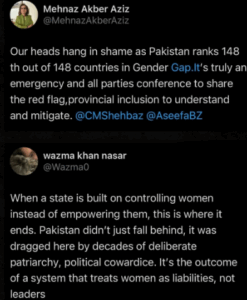
Why This Ranking Is a National Emergency?
This is not just a women’s issue it’s a national crisis. When half of the population is denied basic rights, education, healthcare, and financial independence, the entire country suffers. Economic growth slows, global reputation declines, and generational trauma continues.
The WEF report should not just be another statistic that fades with the news cycle. It is a red flag demanding urgent and serious action. Without bold reforms, from legal protections to societal shifts, Pakistan risks staying trapped at the bottom.
As highlighted in the 2020 report, Pakistan has long struggled with deep-rooted cultural and institutional barriers that make gender equality an uphill battle.
Read More: Why does Pakistan Still Rank Amongst the Lowest on the Global Gender Gap Index 2020?
What Needs to Change?
The road to change is long, but not impossible. Legal reforms must criminalize domestic violence, forced conversions, child marriages, and honor killings. Education needs to be made accessible and safe for girls. Economic opportunities must be created so women can work without fear. Media portrayals should promote healthy relationships and respect for women.
Above all, there needs to be a shift in mindset one that no longer views women as second-class citizens but as equals.
The Road Ahead
The WEF’s Gender Gap Report 2025 should serve as a massive wake-up call for Pakistan. Real change requires political will, legal reforms, societal mindset shifts, and a collective effort from every segment of society. If these systemic issues aren’t addressed, Pakistan risks not only its global standing but also the wellbeing of nearly half its population.
One thing is clear: the world is watching, and so are Pakistan’s women tired of apologies, tired of waiting, and ready for action.
